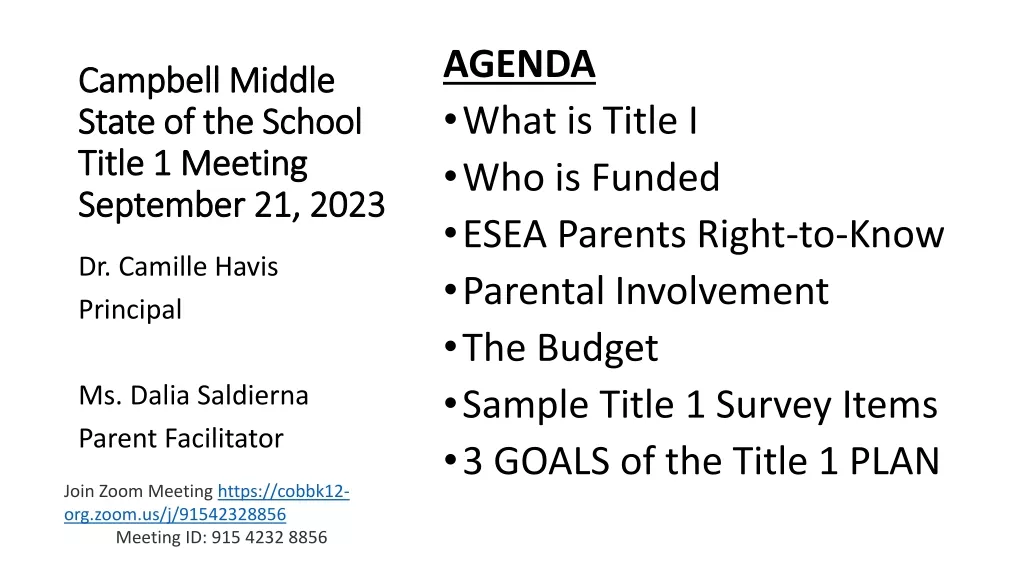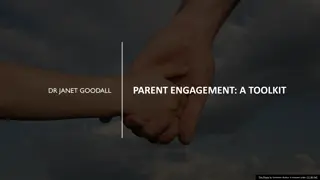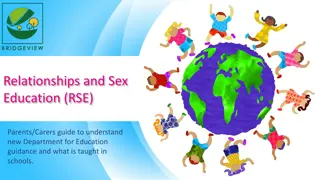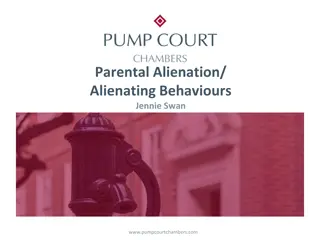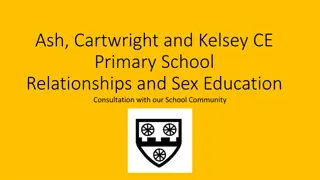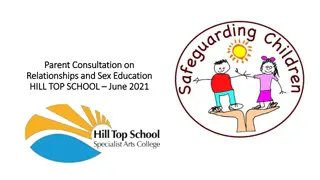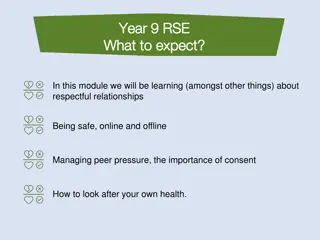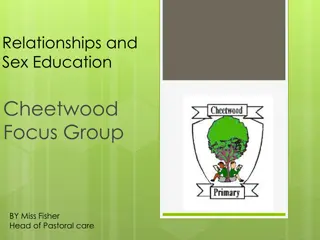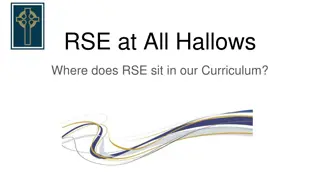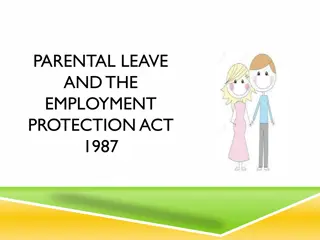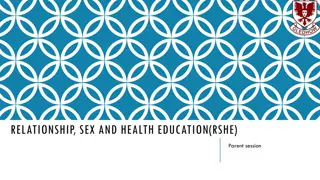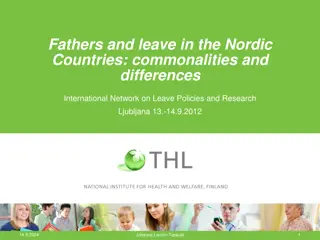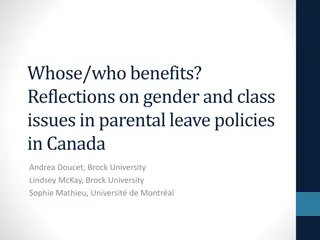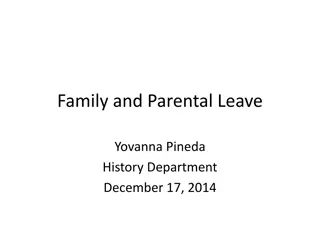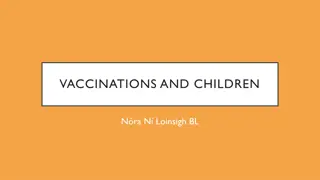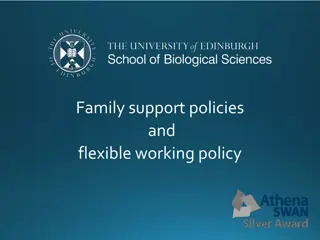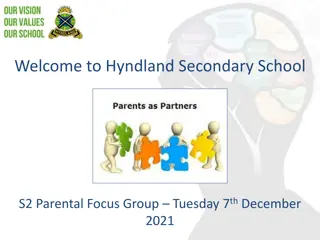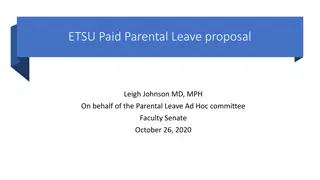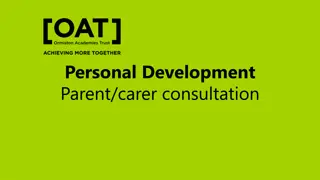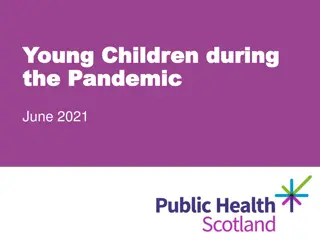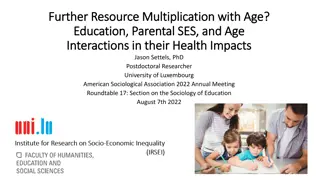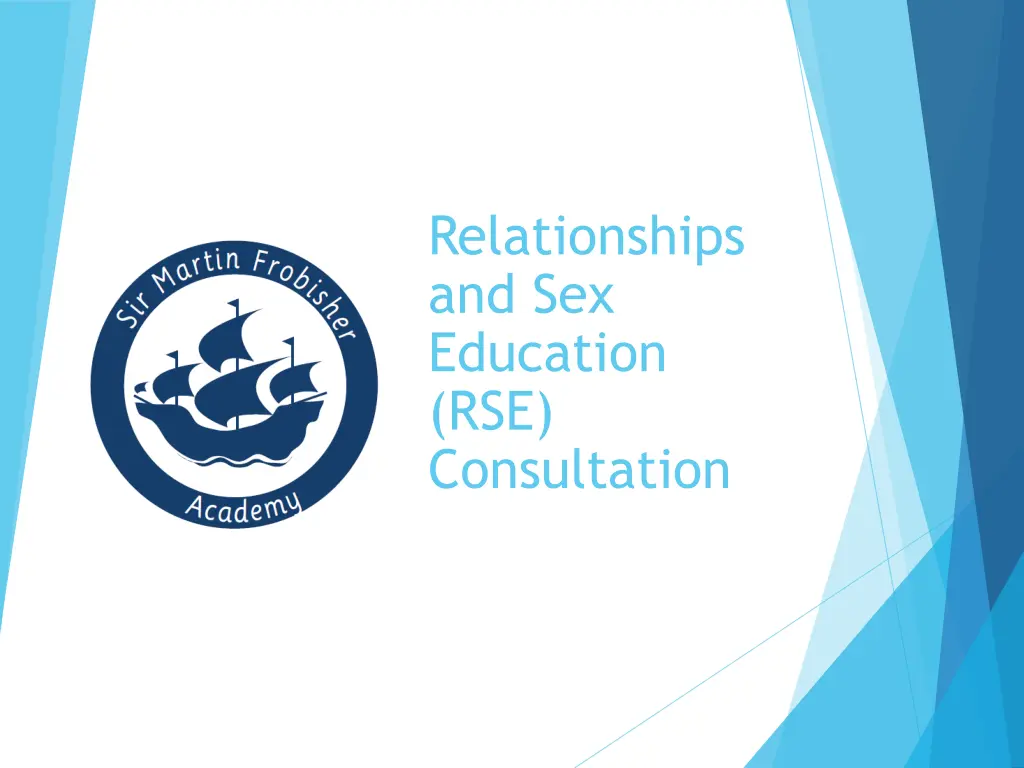
Understanding Relationships and Sex Education (RSE)
Explore the purpose and importance of Relationships and Sex Education (RSE) consultation in schools, emphasizing the need for comprehensive education to empower children in navigating complex modern challenges and building healthy relationships and behaviors. Discover why RSE is crucial for promoting students' well-being, safety, and development in today's digital age, along with insights into the compulsory RSE curriculum introduced by the Department for Education.
Download Presentation

Please find below an Image/Link to download the presentation.
The content on the website is provided AS IS for your information and personal use only. It may not be sold, licensed, or shared on other websites without obtaining consent from the author. If you encounter any issues during the download, it is possible that the publisher has removed the file from their server.
You are allowed to download the files provided on this website for personal or commercial use, subject to the condition that they are used lawfully. All files are the property of their respective owners.
The content on the website is provided AS IS for your information and personal use only. It may not be sold, licensed, or shared on other websites without obtaining consent from the author.
E N D
Presentation Transcript
Relationships and Sex Education (RSE) Consultation
What is the Purpose of this Consultation? As a school, we would always want to deliver a curriculum which has the support of the vast majority, if not all, parents. We recognise that children need an increasing level of skill to deal with the modern world and the impact of social networking, advertising and media. Schools and parents have a responsibility to give a positive message which builds children s resilience to the negative messages they may encounter through the easy availability of pornography / photo-shopped body images / TV programmes such as Love Island which portray sex as separate from relationships. We would want all pupils to grow with the knowledge of natural changes before they happen, and pupils can encounter puberty at a relatively young age. For example, while the average age for a girl to begin menstruation in the UK is 12, many begin in Y6 and some in Y5. Less commonly, girls can begin their periods from 8 yrs old.
What is RSE? The Department for Education is introducing compulsory RSE from September 2020 for all primary schools. Due to the impact of Covid-19 this has now been pushed back to no later than the start of the summer term 2021. The aim of RSE is to give young people the information they need to help them develop healthy, nurturing relationships of all kinds, not just intimate relationships. It should enable them to know what a healthy relationship looks like and what makes a good friend, a good colleague and a successful marriage or other type of committed relationship. It should teach what is acceptable and unacceptable behaviours in relationships. Pupils will understand the positive effects that good relationships have on their mental wellbeing, identify when relationships are not right and understand how such situations can be managed. The Department for Education recommends that all primary schools have a sex education programme tailored to the age and the physical and emotional maturity of the pupils. It should ensure that both boys and girls are prepared for the changes that adolescence brings and drawing on knowledge of the human life cycle set out in the national curriculum for science how a baby is conceived and born.
Why is RSE Important? Today s children and young people are growing up in an increasingly complex world and living their lives seamlessly on and offline. This presents many positive and exciting opportunities, but also challenges and risks. In this environment, children and young people need to know how to be safe and healthy, and how to manage their academic, personal and social lives in a positive way. High quality RSE helps create safe school communities in which students can grow, learn, and develop positive, healthy behaviour for life. RSE plays a vital part in schools fulfilling their statutory duties to protect and safeguard their students. Ofsted is clear that schools must have a preventative programme that enables students to learn about safety and risks in relationships. Schools maintain a statutory obligation under the Children Act (2004) to promote their students wellbeing and under the Education Act (2002) to prepare children and young people for the challenges, opportunities and responsibilities of adult life. A comprehensive RSE programme can have a positive impact on students health and wellbeing and their ability to achieve, and can play a crucial part in meeting these obligations. Technology is evolving at a tremendous pace. The need to protect children and young people from inappropriate online content, cyberbullying and exploitation is a growing concern. A comprehensive RSE programme can support in addressing these issues.
What are the benefits of teaching RSE? RSE explains the positive qualities of relationships, such as trust, respect and commitment as well as recognising that there are different types of relationships and families. It raises the importance of educating children about gender equality, consent, relationships and sex in an age appropriate way. RSE can provide young people with the knowledge required to resist peer, partner and media pressure and understand issues of consent as well as what is and is not appropriate behaviour. There is evidence that good quality RSE teaching can help young people to: Have consensual relationships Delay the age of first sexual encounters Prevent underage pregnancy Know who to report abuse to Have improved sexual health
Extract from DFE Statutory Guidance To embrace the challenges of creating a happy and successful adult life, pupils need knowledge that will enable them to make informed decisions about their wellbeing, health and relationships and to build their self-efficacy. Pupils can also put this knowledge into practice as they develop the capacity to make sound decisions when facing risks, challenges and complex contexts. Everyone faces difficult situations in their lives. These subjects can support young people to develop resilience, to know how and when to ask for help, and to know where to access support. High quality, evidence-based and age-appropriate teaching of these subjects can help prepare pupils for the opportunities, responsibilities and experiences of adult life. They can also enable schools to promote the spiritual, moral, social, cultural, mental and physical development of pupils, at school and in society. The duties on schools in this area are set out in legislation.
What does the guidance from DFE mean? Relationship Education will be compulsory in all schools with primary schools being urged to include sex elements where appropriate Health Education will be compulsory in all schools All schools must have a written policy for RSE All schools may teach about faith perspectives and balanced debate may take place about issues that are seen as contentious . Religious leaders from different faith backgrounds have been involved in developing the RSE curriculum At the point at which schools consider it appropriate to teach their pupils about LGBT, they should ensure it is fully integrated . Schools should ensure that the needs of all pupils are appropriately met must comply with the Equality Act 2010 and protect individuals from discrimination. There are 9 protected characteristics (aspects of a person s identity) Puberty including menstruation should be addressed before onset .
Overview of Teaching Expectations Relationships Education is introduced at Primary and students explore the following areas: Families and people who care for me Caring Friendships Respectful Relationships Online Relationships Being Safe Sex education is not compulsory in primary schools. Primary schools that choose to teach sex education should tailor teaching to take account of the age and the physical maturity of their pupils and must allow parents to withdraw their children where requested.
Which other subjects does it relate to in the national curriculum? Science In KS1 - Pupils should be taught to notice that animals, including humans, have offspring which grow into adults. They should also be introduced to the processes of reproduction and growth in animals. The focus at this stage should be on questions that help pupils to recognise growth; they should not be expected to understand how reproduction occurs. The following examples might be used: egg, chick, chicken; egg, caterpillar, pupa, butterfly; spawn, tadpole, frog. Growing into adults can include reference to baby, toddler, child, teenager, adult. In Upper KS2 (Y5/6) - Pupils should be taught to describe the differences in the life cycles of a mammal, an amphibian, an insect and a bird and describe the life process of reproduction in some plants and animals. Pupils should find out about different types of reproduction, including sexual and asexual reproduction in plants, and sexual reproduction in animals. They might observe changes in an animal over a period of time (for example, by hatching and rearing chicks), comparing how different animals reproduce and grow. Pupils should be taught to describe the changes as humans develop to old age. Pupils should draw a timeline to indicate stages in the growth and development of humans. They should learn about the changes experienced in puberty.
Why are LBGT issues included? There has been much mis-information in the media about how LGBT+ issues are to be taught within the Relationships, Health and Sex Education curriculum in primary schools. We believe that all pupils should be taught about the society in which they are growing up. Relationships Education is designed to foster respect for others and for difference and educate pupils about healthy relationships. We also believe that children should receive teaching on LGBT content during their school years. Teaching children about the society that we live in and the different types of loving, healthy relationships that exist is very important. The DFE have stated: Pupils should be able to understand the world in which they are growing up, which means understanding that some people are LGBT, that this should be respected in British society, and that the law affords them and their relationships recognition and protections Sexual orientation is a protected characteristic, as defined by the Equality Act 2010, and therefore it is illegal to show prejudices against anyone for it. Throughout our school we show respect for others and celebrating our differences.
How will we be teaching RSE? We have recently purchased Jigsaw, the Mindful Approach To PSHE . You may have heard your child talk about this at home. The Jigsaw PSHE Programme includes lessons on ALL aspects of compulsory Relationships and Health Education, designed in a sensitive, spiral, age-appropriate curriculum. The Jigsaw teaching materials integrate Personal, Social, Health Education (PSHE), emotional literacy, social skills, mindfulness, and spiritual development in a whole-school approach. The expectations of the DfE Relationships and Health Education guidance are woven throughout Jigsaw but specifically covered in the Relationships and Healthy Me Puzzles (units), with puberty and human reproduction being taught in the Changing Me Puzzle.
What is included in the Changing Me unit? Jigsaw s Changing Me unit is taught over a period of 6 weeks, usually in the second half of the summer term. Each year group will be taught appropriate to their age and developmental stage, building on the previous years learning. At no point will a child be taught something that is inappropriate; and if a question from a child arises and the teacher feels it would be inappropriate to answer, (for example, because of its mature or explicit nature), the child will be encouraged to ask his/her parents or carers at home. The question will not be answered to the child or class if it is outside the remit of that year group s programme
The Changing Me Puzzle is all about coping positively with change and includes: Reception Growing up: how we have changed since we were babies. Year 1 Boys and girls bodies; correct names for body parts. Year 2 Boys and girls bodies; body parts and respecting privacy (which parts of the body are private and why this is). Year 3 How babies grow and how boys and girls bodies change as they grow older. Introduction to puberty and menstruation. Year 4 Internal and external reproductive body parts. Recap about puberty and menstruation. Conception explained in simple terms. Year 5 Puberty for boys and girls in more detail including the social and emotional aspects of becoming an adolescent. Conception explained in simple biological terms. Year 6 Puberty for boys and girls revisited. Understanding conception to the birth of a baby. Becoming a teenager. All lessons are taught using correct terminology, child-friendly language and diagrams. Children will be taught in single sex age groups where appropriate
Can parents withdraw their child? Parents have a right to withdraw their children from all or any part of Sex Education aspect of RSE if they wish to do so, but not from the biological aspects of human growth and reproduction provided under the National Curriculum for science. Parents do not have to give reasons for withdrawing their child but must inform the head teacher. Requests for withdrawal should be put in writing, making it clear which aspects of the programme they do not wish their child to participate in.
Which lessons can parents withdraw their children from? At Sir Martin Frobisher Academy, puberty is taught as a statutory requirement of Health Education and covered by our Jigsaw PSHE Programme in the Changing Me Puzzle (unit). We conclude that sex education refers to Human Reproduction, and therefore parents can request their child be withdrawn from the PSHE lessons that explicitly teach this i.e. the Jigsaw Changing Me Puzzle (unit) e.g. Year 4, Lesson 2 (Having a baby) Year 5, Lesson 4 (Conception) Year 6, Lesson 4 (Conception, birth) Alternative work will be given to pupils who are withdrawn from non-statutory components of Sex Education. Examples of the content of these lessons can be made available to parents if they wish.
Feedback If you have any questions or feedback please email the school office for the attention of the Headteacher Frobisher.Admin.smfa.org.uk

